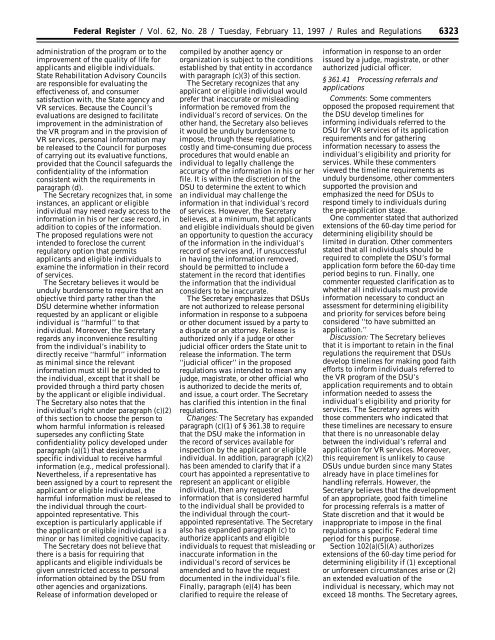federal register - U.S. Government Printing Office
federal register - U.S. Government Printing Office
federal register - U.S. Government Printing Office
Create successful ePaper yourself
Turn your PDF publications into a flip-book with our unique Google optimized e-Paper software.
Federal Register / Vol. 62, No. 28 / Tuesday, February 11, 1997 / Rules and Regulations6323administration of the program or to theimprovement of the quality of life forapplicants and eligible individuals.State Rehabilitation Advisory Councilsare responsible for evaluating theeffectiveness of, and consumersatisfaction with, the State agency andVR services. Because the Council’sevaluations are designed to facilitateimprovement in the administration ofthe VR program and in the provision ofVR services, personal information maybe released to the Council for purposesof carrying out its evaluative functions,provided that the Council safeguards theconfidentiality of the informationconsistent with the requirements inparagraph (d).The Secretary recognizes that, in someinstances, an applicant or eligibleindividual may need ready access to theinformation in his or her case record, inaddition to copies of the information.The proposed regulations were notintended to foreclose the currentregulatory option that permitsapplicants and eligible individuals toexamine the information in their recordof services.The Secretary believes it would beunduly burdensome to require that anobjective third party rather than theDSU determine whether informationrequested by an applicant or eligibleindividual is ‘‘harmful’’ to thatindividual. Moreover, the Secretaryregards any inconvenience resultingfrom the individual’s inability todirectly receive ‘‘harmful’’ informationas minimal since the relevantinformation must still be provided tothe individual, except that it shall beprovided through a third party chosenby the applicant or eligible individual.The Secretary also notes that theindividual’s right under paragraph (c)(2)of this section to choose the person towhom harmful information is releasedsupersedes any conflicting Stateconfidentiality policy developed underparagraph (a)(1) that designates aspecific individual to receive harmfulinformation (e.g., medical professional).Nevertheless, if a representative hasbeen assigned by a court to represent theapplicant or eligible individual, theharmful information must be released tothe individual through the courtappointedrepresentative. Thisexception is particularly applicable ifthe applicant or eligible individual is aminor or has limited cognitive capacity.The Secretary does not believe thatthere is a basis for requiring thatapplicants and eligible individuals begiven unrestricted access to personalinformation obtained by the DSU fromother agencies and organizations.Release of information developed orcompiled by another agency ororganization is subject to the conditionsestablished by that entity in accordancewith paragraph (c)(3) of this section.The Secretary recognizes that anyapplicant or eligible individual wouldprefer that inaccurate or misleadinginformation be removed from theindividual’s record of services. On theother hand, the Secretary also believesit would be unduly burdensome toimpose, through these regulations,costly and time-consuming due processprocedures that would enable anindividual to legally challenge theaccuracy of the information in his or herfile. It is within the discretion of theDSU to determine the extent to whichan individual may challenge theinformation in that individual’s recordof services. However, the Secretarybelieves, at a minimum, that applicantsand eligible individuals should be givenan opportunity to question the accuracyof the information in the individual’srecord of services and, if unsuccessfulin having the information removed,should be permitted to include astatement in the record that identifiesthe information that the individualconsiders to be inaccurate.The Secretary emphasizes that DSUsare not authorized to release personalinformation in response to a subpoenaor other document issued by a party toa dispute or an attorney. Release isauthorized only if a judge or otherjudicial officer orders the State unit torelease the information. The term‘‘judicial officer’’ in the proposedregulations was intended to mean anyjudge, magistrate, or other official whois authorized to decide the merits of,and issue, a court order. The Secretaryhas clarified this intention in the finalregulations.Changes: The Secretary has expandedparagraph (c)(1) of § 361.38 to requirethat the DSU make the information inthe record of services available forinspection by the applicant or eligibleindividual. In addition, paragraph (c)(2)has been amended to clarify that if acourt has appointed a representative torepresent an applicant or eligibleindividual, then any requestedinformation that is considered harmfulto the individual shall be provided tothe individual through the courtappointedrepresentative. The Secretaryalso has expanded paragraph (c) toauthorize applicants and eligibleindividuals to request that misleading orinaccurate information in theindividual’s record of services beamended and to have the requestdocumented in the individual’s file.Finally, paragraph (e)(4) has beenclarified to require the release ofinformation in response to an orderissued by a judge, magistrate, or otherauthorized judicial officer.§ 361.41 Processing referrals andapplicationsComments: Some commentersopposed the proposed requirement thatthe DSU develop timelines forinforming individuals referred to theDSU for VR services of its applicationrequirements and for gatheringinformation necessary to assess theindividual’s eligibility and priority forservices. While these commentersviewed the timeline requirements asunduly burdensome, other commenterssupported the provision andemphasized the need for DSUs torespond timely to individuals duringthe pre-application stage.One commenter stated that authorizedextensions of the 60-day time period fordetermining eligibility should belimited in duration. Other commentersstated that all individuals should berequired to complete the DSU’s formalapplication form before the 60-day timeperiod begins to run. Finally, onecommenter requested clarification as towhether all individuals must provideinformation necessary to conduct anassessment for determining eligibilityand priority for services before beingconsidered ‘‘to have submitted anapplication.’’Discussion: The Secretary believesthat it is important to retain in the finalregulations the requirement that DSUsdevelop timelines for making good faithefforts to inform individuals referred tothe VR program of the DSU’sapplication requirements and to obtaininformation needed to assess theindividual’s eligibility and priority forservices. The Secretary agrees withthose commenters who indicated thatthese timelines are necessary to ensurethat there is no unreasonable delaybetween the individual’s referral andapplication for VR services. Moreover,this requirement is unlikely to causeDSUs undue burden since many Statesalready have in place timelines forhandling referrals. However, theSecretary believes that the developmentof an appropriate, good faith timelinefor processing referrals is a matter ofState discretion and that it would beinappropriate to impose in the finalregulations a specific Federal timeperiod for this purpose.Section 102(a)(5)(A) authorizesextensions of the 60-day time period fordetermining eligibility if (1) exceptionalor unforeseen circumstances arise or (2)an extended evaluation of theindividual is necessary, which may notexceed 18 months. The Secretary agrees,


